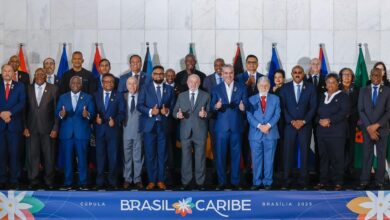(CARICOM Secretariat, Turkeyen, Greater Georgetown, Guyana)CARICOM Secretary-General, His Excellency Edwin Carrington concluded and signed a Memorandum of Understanding (MOU) on Tuesday 1 August between the CARICOM Secretariat, on behalf of the Mainstreaming Adaptation to Climate Change (MACC) Project, and the Caribbean Community Climate Change Centre (CCCCC). Dr Kenrick Leslie, the Executive Director of the Centre, signed on its behalf at the ceremony which took place one year after the official opening of the CCCCC. Both the Centre and the MACC Project are located in Belize.
The MOU provides for, among other things, the exchange of information and documentation on climate change; policy and technical support for and coordination of the articulation of regional positions on climate change matters; identification of opportunities for resource mobilisation; and the sharing of physical and human resources to improve efficiency and effectiveness of both organisations.
It also allows for cooperation, where possible, in the implementation of some components of the Project, including the building of capacity to: assess vulnerability and risks associated with climate change; reduce vulnerability to climate change, and to effectively assess and utilise resources to reduce vulnerability to climate change. The MOU also provides for cooperation in Public Education and Outreach programmes.
The Secretary-General and the Executive Director discussed ways to strengthen collaboration between the MACC project and the Centre. The Secretariat team, which included the Deputy Secretary-General, Her Excellency Ambassador Lolita Applewhaite, the Assistant Secretary-General for Regional Trade and Economic Integration, His Excellency Ambassador Irwin La Rocque and the Chef de Cabinet in the Office of the Secretary-General, Ms Glenda Itiaba, also held discussions with the Project Implementation Unit of the MACC Project which is led by Dr Ulric Trotz.
The objective of the MACC project is to create the capacity and the environment in the Small Island and Low-Lying Coastal developing states in CARICOM to implement adaptation measures to minimise the adverse impact of climate change. The main elements of the project include expanding and strengthening the technical and information capacity to assess vulnerability and the risks associated with global climate change and the development of a regional position on adaptation and mainstreaming adaptation to climate change in national development planning and public and private sector development strategies.
MACC is a US $10.9 M project financed by the Global Environment Facility (GEF), CARICOM Member States, the Government of Canada and the Government of the United States of America, through the National Oceanic and Atmospheric Administration.
The twelve (12) participating countries are Antigua and Barbuda, The Bahamas, Barbados, Belize, Dominica, Grenada, Guyana, Jamaica, St. Kitts and Nevis, Saint Lucia, St. Vincent and the Grenadines and Trinidad and Tobago.
The role of the Climate Change Centre in the Region includes protection of the climate system; enhancement of regional institutional capabilities for the co-ordination of national responses to the negative effects of climate change; the provision of comprehensive policy and technical support in the area of climate change and related issues; spearheading regional initiatives in these areas and being the executing agency for regional environmental projects related to climate change.
While in Belize, the Secretary-General paid a courtesy call on the Prime Minister of Belize the Honourable Said Musa on Wednesday 2 August, the last day of his four-day visit to that Member State. Earlier in his visit, Mr. Carrington met with the Deputy Prime Minister the Hon John Briceno.
The Secretary-General also took the opportunity to formally hand over the CARICOM video conferencing facilities to the Government of Belize on Tuesday 1 August. Mr Briceno received the equipment which has been provided to the Community by the Government of Japan. All Member States with the exception of Haiti are now equipped with video conferencing facilities.





